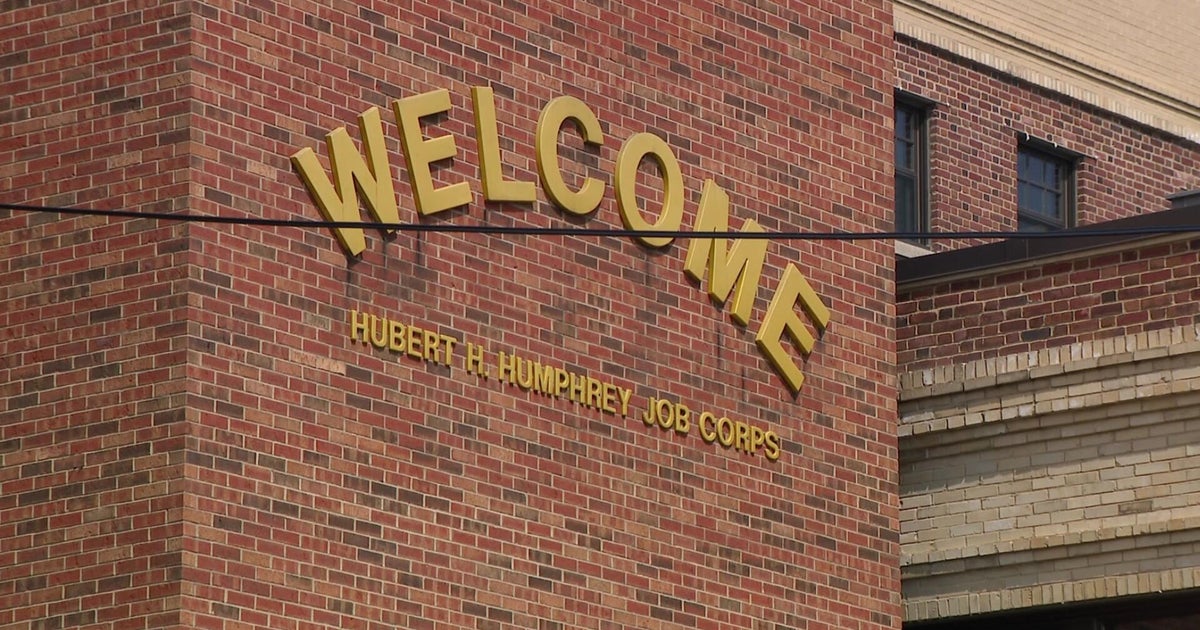Minnesota
Dozens of pigs run loose on Minnesota highway after truck overturns — takes cops 4 hours to corral

This ham on the lam.
Dozens of hogs ran loose on a Minnesota highway Friday after the semi-truck transporting them tipped over.
The rig — which was carrying 50 hogs — overturned just after 7:30 a.m. while traveling north on Interstate 694 near Little Canada, a city roughly 10 miles north of St. Paul, Minnesota State Patrol said.
The pigs scattered from the truck and were caught by city cameras trotting through the morning rush-hour traffic on both sides of the highway.
On the northbound side of the highway, the hogs took over all four lanes of traffic, forcing drivers to travel along the shoulder and causing a mile-long backup until officials shut down the interstate for several hours.
It took officers from four departments — including neighboring officers — nearly four hours to corral the swines, several of which were injured.
Unfortunately, 10 were killed in the crash.

The semi-truck driver was not hurt in the collision, according to Lt. Gordon Shank with the Minnesota State Patrol
It is not clear where the pigs were being transported, but some of their backs were marked with painted numbers, indicating they could have been headed to the slaughterhouse.
Investigators are still looking into what caused the semi to tip on its side as it navigated a curve on the interstate.
With Post Wires

Minnesota
From a foster home to a doctors office, how a Minnesota man defied the odds

Only 3-4% of former foster youth obtain a four-year college degree according to The National Foster Youth Institute.
When WCCO met Michael Kelly a few years ago, he was a young student bucking that trend. He had not only graduated but had started medical school.
WCCO sat down with Kelly again, to reflect on his childhood growing up with Duluth, Minnesota where his life was forever changed by a court-assigned worker.
Here’s the full story:
Life can change an in instant.
For Michael Kelly, his life changed when a worried court-assigned worker found out he was living in a cold garage and eating out of a shoebox.
“[the worker] said, “That’s not what life is supposed to be, we are gonna put you in a foster home,” Kelly recalls.
Eventually at 17 and a half, Kelly moved out of that foster home and became homeless.
“I was a transient, couch surfer,” said Kelly.
Amidst the rockiness, he’d always found stability in school. Kelly got a scholarship to St. John’s University.
“During college, I always had to find opportunities, during Spring break, winter break find places to stay. I didn’t have a place, I didn’t have a bedroom, I didn’t have – the next day wasn’t planned out for me it was just surviving,” said Kelly.
Against all odds, he got in to Medical school at the University of Minnesota.
But things got rocky again…
“I actually failed my first medical school test, by one point, I was devastated by 69%, needed 70% to pass and I was like, ‘I am done,’” said Kelly.
But he didn’t let that derail him.
Kelly didn’t just adjust, he thrived, helping launch a mentorship organization to support first generation students.
“I finally feel like I am in a position where I can give back. It took a lot of support from my village, but I am finally at the point I can give back and give to the community,” said Kelly.
He explained the most emotional moment.
“Getting into Mayo was just something that blew my mind, extremely emotional for me,” said Kelly.
A surprise that was recently revealed on residency match day.
“It was trials and tribulations but focusing on the why got me to where I am today and I am going to Mayo in two months, to be a doctor,” said Kelly.
Kelly walked, and the people who’ve walked beside him, cheered, including his wife, who he met in college, and her family.
Kelly’s mother-in-law said, “He’s just a good person and it comes through in everything that he does.”
Kelly’s oldest friend, Mona Zeidan said, “He was very much a people pleaser and I’m not surprised he became a doctor, I am really not. He used to say when we were kids that he was gonna be a doctor and we’d chuckle about it and he did it, he did it.”
YES, he did.
Kelly told WCCO, “I think at the end of the day I just want my patients to feel seen, valued and loved.”
So after years of discomfort, this doctor is devoted to truly making make others feel good.
Kelly chose family medicine and wants to practice in a rural area. He says what he loves about that is that you can serve patients of all ages starting at birth and have long-term relationships.
Minnesota
After ‘thawing out,’ Twins reveling in the Minnesota sun

With roots in Southern California, where the weather is notoriously perfect for baseball, Twins first baseman Ty France – in his first season in Minnesota after spending 2024 with Cincinnati – admitted there is a little more spring in the step when you come to work on a June morning with sunshine, low humidity and the thermometer headed for the 70s.
“Whenever you get a little bit of sunshine, it’s nice to get out there,” France said prior to Saturday’s game versus Toronto, admitting that recent road trips have offered better weather than what they experienced at home early in the season.
“The first month was a little bit of a grind, but we ran into some warm weather too, in Tampa, Sacramento, Seattle was nice,” France said. “But it’s nice coming home to this, for sure.”
First proposed in the late 1990s, the original plans for a ballpark to replace the Metrodome included a retractable roof similar to those in Seattle and Houston. When legislators and much of the voting public in Minnesota soundly rejected the cost of a retractable roof facility, the design of what eventually became Target Field was scaled back, and outdoor baseball – for better or worse depending on the whims of Minnesota weather – returned in 2010.
Some believe that April and May games at Target Field, when the weather can be colder than anywhere else in the majors, give the Twins a home field advantage. On a smaller scale, similar to what the Minnesota Vikings enjoyed for their first two decades, playing outdoors at Met Stadium, where the weather could be frigid late in the football season.
France said they play in any temperature, but admitted that short sleeves and sunglasses are ideal.
“It’s a more comfortable environment for us,” he said. “I don’t know if it’s necessarily an advantage, but once we get the opportunity to thaw out after the first month, it’s nice. I haven’t played here in the summertime, but I’ve heard the ball starts carrying a little better, and I’m looking forward to that.”
Lewis past slump
After snapping out of a brutal 0-for-32 slump at the plate during the Twins’ three-city road trip, Royce Lewis continues to do good things with his bat, going 3 for 3 with a walk in Friday’s loss to Toronto.
“I think he has looked good at the plate. I think he has looked more comfortable. I think his swing has been synced up really good,” Twins manager Rocco Baldelli said. “Both his timing on his swing, and actually the swing itself, has looked a lot like the Royce you would see last year at times and the year before.”
Lewis, who scored a run in the Twins’ 6-4 loss, said he’s concentrating on what he can control at the plate, and leaving the rest to the hands of fate.
I can only control so much. Once the ball leaves the bat, it’s on God and it’s on those fielders where they’re playing. So I’ve just got to keep doing my thing and controlling what I can control, and looking for my pitch, which is key I think for any hitter,” he said following Friday’s game.
“If you’re looking for your pitch, and you’re focusing on every pitch of every at-bat which is tough to do sometimes, I know you wouldn’t think it, like ‘oh, you should be focused.’ Well, sometimes you just lose sight of your plan. You get homer happy or you swing too hard. Those are the little things that I’m trying to take care of right now. Just breathing and having fun.”
Whatever is working for Lewis, Baldelli wants to see it continue.
“It’s been a week, so we want to keep this going throughout the whole season,” the manager said.
Happy birthday “Buck-Ninety”
Tim Laudner, the former Twins catcher and current member of the broadcast crew, celebrated his 67th birthday on Saturday, noting that he and late Minnesota music icon Prince entered this world on the same day: June 7, 1958.
Born in Iowa, Laudner played high school baseball at Park Center, in the northwest suburbs of Minneapolis and at the University of Missouri before making his major league debut with the Twins in 1981.
As a catcher on Minnesota’s 1987 World Series title team, Laudner was beloved for his local roots, and playfully teased for his light-hitting ways.
He batted .191 for the 1987 season with 16 home runs, prompting some fans to hang a banner from the facing of the Metrodome’s upper deck during the playoffs with Laudner’s number, declaring them members of the “Buck-Ninety Fan Club” in reference to his batting average.
In the clubhouse before Saturday’s game, Laudner joked about being the second most prominent Minnesotan – after Prince, who died in 2016 – but said that a fan once noted that for their careers, Laudner had more hits than the musician.
Originally Published:
Minnesota
Job Corps closure puts dozens of young adults at risk

As the Hubert Humphrey Job Corps Center in Saint Paul prepares to close its doors, dozens of young adults are facing an uncertain future. The closure leaves many without housing, education, or other skills needed to succeed in the workforce.
Last week, the Department of Labor announced that they would pause operations for Job Corps centers nationwide. Students and staff are expected to leave by June 30th.
The Department of Labor decision “aligns with the President’s FY 2026 budget proposal.” Also stating that the Job Corps program has faced “significant financial challenges under its current operating structure.”
“People come to Job Corps because they have no other place to go, they have no other family to turn to,” said Job Corps student, Christopher Walter.
Walter joined the program to get away from a parent that experienced a psychotic episode. He found himself a community, and a family at Job Corps.
“I’m actually crying behind my sunglasses right now,” said Walter. “Job corp was essentially family, it’s a home away from home.”
Job Corps, the largest federal job training program for low-income youth, has been a lifeline for young people, offering a place to live, learn and prepare for careers. Now, with no alternative – the future for these young adults remains unclear.
“It makes me want to cry, it’s just really hard,” said Job Corps staff member Laura Nelson. “They were promised if they worked hard, did what they were supposed to do they’d get something out of it.”
Finding job opportunities, outside resources and homes is all the staff at Job Corps can do for now.
“For every single center across the country you have a homeless population of around 25%,” said Christopher Kuhn, Job Corps Executive Director Center of Operations and Support. “I don’t know where they all will go and I don’t know what services will be available for them.”
While the closure has been met with shock and disappointment, local organizations like the Salvation Army’s Booth Brown House, is stepping up to support. The Booth Brown House, a shelter for homeless young adults, is preparing for the surge of homeless youth displaced by the job corps closure.
“We do have capacity in our emergency shelter to take a handful and we have seen interest from those youth when the time comes,” said Erin Foss, Program Director at the Booth Brown House.
Although disappointed at the closure, Foss remains hopeful. The Booth Brown House staff visited the Job Corps to discuss housing and job opportunities.
“We’re going to do our best to keep encouraging and assist them in finding other resources so these youth continue to move forward and don’t fall through the cracks,” said Foss.
Pushing back, Christopher Kuhn, is urging the public to ensure that these young adults don’t get forgotten.
“America needs skilled workers, let us help. That’s what we do. Otherwise you’ll have a whole generation of young people that’ll be a burden on our economy and society, when they can really be contributors. And they want to be, they want to help,” said Kuhn.
As the June 30th deadline approaches, the future of the young adults still remains uncertain. But there is still hope for some of the students and staff at the Hubert Humphrey Job Corps Center and centers across the nation.
On June 3rd, the National Job Corps Association (NCJA) filed “a motion for a temporary restraining order in U.S. District Court for the Southern District of New York to stop the U.S. Department of Labor’s (DOL) closure of 99 Job Corps campuses nationwide.”
On Wednesday, U.S. District Judge Andrew Carter in Manhattan temporarily blocked the Trump Administration from eliminating the Job Corps program.
A hearing is set for June 17, where the fate of the program will be decided.
-

 News1 week ago
News1 week agoVideo: Faizan Zaki Wins Spelling Bee
-

 Politics1 week ago
Politics1 week agoMichelle Obama facing backlash over claim about women's reproductive health
-

 Technology1 week ago
Technology1 week agoOpenAI wants ChatGPT to be a ‘super assistant’ for every part of your life
-

 Technology1 week ago
Technology1 week agoSEC drops Binance lawsuit in yet another gift to crypto
-

 Movie Reviews1 week ago
Movie Reviews1 week agoThe Verdict Movie Review: When manipulation meets its match
-

 Technology1 week ago
Technology1 week agoWhy do SpaceX rockets keep exploding?
-

 World1 week ago
World1 week agoTwo killed in Russian attacks on Ukraine before possible talks in Turkiye
-

 News1 week ago
News1 week agoOil companies face a wrongful death suit tied to climate change



















